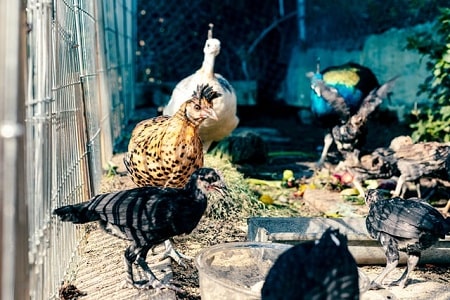If you’re thinking about keeping peacocks or peahens with chickens, they can absolutely live happily together if managed property. You do have to keep in mind that peacocks and chickens are very different in many ways though.
Table of Contents
Can You Raise Peacocks With Chickens?
You can raise peafowl with chickens, yes. I’ve read numerous accounts and met several people who have done so without any issues,
More than just being fine, if you have space and means to raise peafowl, you’re in for a lot of fun!
The local farm where I help out in my city has peacocks and chickens roaming freely together. I always enjoy seeing them interact, although ‘interacting’ mostly consists of seeing who can find bits of food and run off with it.
The two main obvious concerns are:
- Fighting, injuring, or worse between peacocks and chickens, and
- Diseases; most notably ‘Blackhead disease’ which is more common among game birds than chickens but can be passed between the two.
Here’s a look at how serious a problem these things are:
Related - Want to keep chickens and turkeys together? Here’s what you need to know.
Want to buy peafowl chicks? Click here to see what availability they have over at Cackle Hatchery. Cackle Hatchery is an online hatchery with one of the largest varieties of poultry. They ship out all over the country, and have excellent customer service!
Will Peacocks Kill Chickens?
It’s certainly possible for peacocks to kill chickens. Peacocks are generally friendly in nature, but they are still game birds with some weapons on their feet and a strong beak designed to eat prey.
I have found stories of peacocks killing chickens while researching this article. Although, it was always incidents of wild peacocks attacking backyard chickens.
When peafowl are raised with chicks and they’re taken care of and get to know each other, incidents or serious injuries are few and far between.
Will Chickens Kill Peacocks?
This is even less likely, if not unheard of. At least talking about adult chickens and peacocks.
Both birds are capable of putting up a fight, especially if they’re protecting their young. But I couldn’t find any incidents of chickens killing peacocks.
Just think about it, some adult peafowl like the Indian peafowl are up to 5 feet long. They’re magnificent animals (as are chickens of course), but they’re much larger than chickens.
Is Blackhead Disease a Risk When Raising Chickens and Peacocks?
Blackhead disease, which is the more common and easier to say name for Histomoniasis is a disease that affects poultry, and more commonly game birds like quail, pheasants, partridges, and peacocks.
This disease is usually spread by roundworms. This is how it gets into the infected bird’s cecum, which is in the digestive tract. The disease then damages the liver and other areas of the digestive system.
It’s not always easy to tell if a bird has Blackhead disease without having a vet perform an examination. The typical signs are lethargy, looking unkempt, and possibly yellow droppings.
While it’s a devastating disease and can easily be spread from peafowl to chickens, if you don’t have Blackhead within your flock or on your property, the risk is very low.
There are also ways to control and treat Blackhead disease if spotted early. If you see any signs of either your peafowl or chickens being unwell, always take action sooner rather than later.
Related - You can keep guinea fowl with chickens, here's how.
Looking After Peacocks Is Very Different From Chickens!

Living with one another is one thing, knowing what you’re letting yourself in for when raising peafowl is another.
Don’t worry, I’m not going to try and talk you out of it. Raising peafowl is a lot of fun, and I totally recommend it. You do need to know that peacocks are a lot less self-sufficient than chickens and have different needs though.
Some of the main considerations are going to be:
Housing
You’re going to need a separate housing area for your peafowl. Typically, peafowl are kept in a large aviary or fenced area in captivity as opposed to coop like chickens.
They also need to be kept contained for a few weeks when first brought home or hatched, too. If they’re not acclimatized to their living area they will disappear in a hurry.
Ideally, they need more land to roam and free-range over. Peafowl love finding insects to eat and scratching around. They’ll travel a much further distance than chickens given the opportunity.
Feeding
Peafowl are great opportunistic feeders in the wild - that’s how they survive. They’ll eat a wide range of plants and just about anything that moves and is small enough to eat.
In captivity, you’re going to need to supplement their diet with a commercial peafowl or game feed. It’s also important you keep their feed locked away from chickens and vice versa.
Flight Risk
One of the best things about raising chickens is that they don’t present much of a flight risk. It’s not that hard to keep them on your land, and they come back to their coop at night.
Peafowl on the other hand are much better at flying and can scale much higher fences. They’re also not so obedient when it comes to coming home to roost for the night.
You’re likely going to have to get their wings clipped if you’re letting them roam around. Even then, they can still jump up about 8 feet to roost.
I’d discuss this with the breeder you’re buying from. Explain what kind of land you have, where you’re going to be keeping them etc. and see what they advise.
Related - How to keep your chickens out of your neighbor’s yard.
In Summary
If you’re planning on expanding your backyard menagerie to include peafowl, I’m envious. They’re amazing creatures, and there’s no denying that few birds have such impressive colors or a more iconic feather display.
There are some precautions and things to be aware of, but generally speaking, it’s not difficult and doesn’t present much in the way of risk when raising peacocks and chickens together.
Want to buy peafowl chicks? Click here to see what availability they have over at Cackle Hatchery. Cackle Hatchery is an online hatchery with one of the largest varieties of poultry. They ship out all over the country, and have excellent customer service!
Resources
Image credits - Header photo by Kelly Sikkema, in body image by Amy Lynn Grover on Unsplash
Blackhead disease in poultry - FDA.gov




